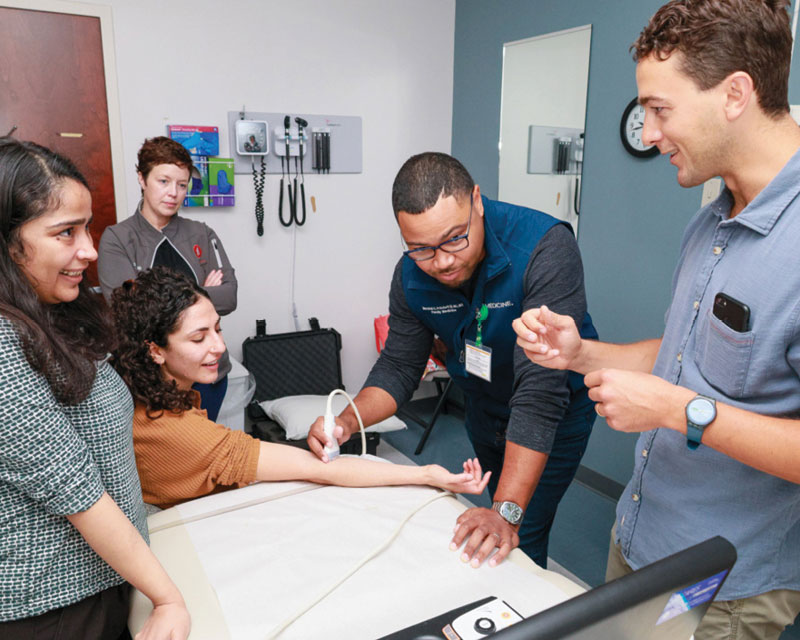It’s been called “The Stethoscope of the Future.” Point-of-care ultrasound (POCUS) can be applied in a variety of settings thanks to its small size and portability, from hospital bedsides to sports sidelines to primary care clinics. These palm-sized devices allow health care providers to quickly and easily perform ultrasound scans, creating detailed images that can help clinicians make informed decisions or provide real-time guidance during a procedure. The devices can aid in identifying various conditions, including soft-tissue infections, fluid accumulation, and heart failure.
In August 2023, the UAB Department of Family and Community Medicine launched an initiative to give every Heersink School of Medicine student across all four of the school’s campuses access to POCUS units, making UAB one of the first medical schools in the United States to provide such access. The initiative was funded with $2 million in federal funds from the department’s Comprehensive Urban Underserved and Rural Experience (CU2RE) program, which is supported by the U.S. Health Resources and Services Administration.
Alabama faces a projected shortage of more than 600 primary care physicians by 2030, and many patients in underserved rural and urban areas already face significant wait times for appointments or have to travel long distances for medical care. Point-of-care ultrasound can play an important role in addressing these shortages by enabling health care providers in resource-strapped areas to conduct ultrasound tests directly in their clinics and quickly get the information they need, instead of requiring the patient to travel to another location or wait for results.

Thanks to the initiative, Heersink medical students will begin learning to use the devices to evaluate every central organ system, diagnose injuries or diseases, and perform procedures. The department will distribute 600 devices for student use and 100 for community preceptors who help train Heersink medical students in their clinics.
“The future of medicine, especially primary care in rural and underserved areas, will require physicians to be nimble, meet patients where they are, and find efficient ways to address a wide variety of concerns right there in clinic,” said Irfan Asif, M.D., chair of the Department of Family and Community Medicine, associate dean for Primary Care and Rural Health, and director of UAB’s primary care service line. “Point-of-care ultrasound offers a great way to do that, especially in rural areas with less access to major hospital systems or other points of care.”
In addition to training students, partnerships with organizations like the Global Ultrasound Institute (GUSI) provide POCUS training for faculty and residents. GUSI provides intensive seminars and skills refinement sessions, ensuring educators can effectively incorporate POCUS into the curriculum.
Since October 2023, the Heersink School of Medicine's Department of Medical Education has hosted several faculty training sessions facilitated by GUSI. In the hands-on sessions, faculty have been able to use POCUS devices on standardized patients and, guided by GUSI staff, see the technology’s impact on patient examination. The events include demonstrations and practice sessions in cardiac, pulmonary, abdominal, vascular, and musculoskeletal imaging. The focus is on simple imaging techniques that allow clinicians to make diagnoses at the bedside that previously would incur the delay and cost of formal imaging. This can be life-saving in emergency or low-resource settings.
According to Senior Associate Dean for Medical Education Craig Hoesley, M.D., “Our mission is to serve the patients of our state, many of whom reside in rural areas and who would benefit from physicians empowered with the training to use this technology effectively. Equipping our faculty and students with this level of knowledge and training is a major step forward for our institution and the physicians we train in accomplishing this goal.”
The CU2RE program is designed to enhance the recruitment, training, and retention of medical students dedicated to serving as family medicine physicians to provide primary care in the medically underserved urban and rural areas of Alabama. The enriched training program addresses six core areas related to interprofessional education, behavioral health, social determinants of health, cultural and linguistic competency, practice transformation, and telehealth. The program has two pathways—Urban Underserved and Rural—for students interested in primary care, health equity, and serving underserved patients.
-Kayla Gibson and Caroline Newman